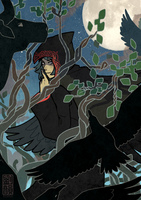Morrígan was born the child of Ernmas and Delbáeth, into a clan descended from the great mother Danu herself. While their sister Ériu became the pop-star Goddess of Ireland and had the entire island named after herself, Morrígan did not take on quite so grandiose nor popular a role: they were accorded the task of marking souls for death, and escorting them to the Otherworld.
As the overseer of death, particularly on the battlefield, and one in charge of foretelling it, Morrígan plays a role similar to that of reapers operating across Europe and America. Sometimes they find their hand moved by the voice of fate, which stands above and beyond even the gods; sometimes they have a choice over the matter of who lives and who dies.
They sends their ravens out to tag the imminently dead, and to warn them of their impending demise. Then, when the time comes, they arrive to collect their due.
To Morrígan, this is a mercy: the freedom to prepare for one's death is not one that most enjoy. Sadly most seem to prefer to use this opportunity to attempt to avoid their death, locking themselves away from harm and inadvertently hoisting themselves by their own petards.






Comments